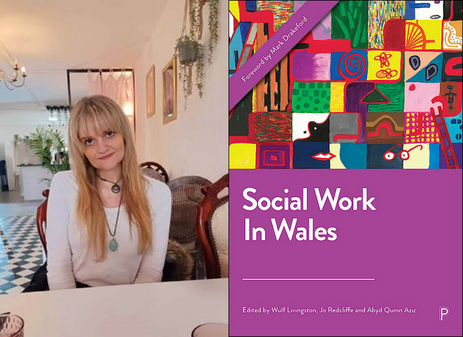Social Work in Wales: Trauma-Informed Practice in the Welsh Youth Justice Service

Dr Tegan Brierley-Sollis has published a book chapter, ‘Trauma-informed practice in the Welsh Youth Justice Service’ in ‘Social Work in Wales’ (Livingston et al., 2023). This book explores what makes the Welsh Social Work context distinctive and encompasses a range of voices including academic, individual, student and practitioner.
The chapter is based on Tegan’s PhD research which focused on the emerging trauma-informed culture of the North Wales Youth Justice Service. Utilising accounts of justice-involved children and service providers, the shift to trauma-informed practice including the enabling factors and challenges was examined.
Trauma-Informed Youth Justice in Wales
The Youth Justice Blueprint 2019 sets out four key principles including drawing upon a trauma-informed approach through the various stages of the youth justice service, ensuring trauma-informed approaches are embedded into community and custodial practices, taking a child-first approach and creating a whole system strategy via the aligning of devolved and non-devolved services. The ambition of the blueprint demonstrates the way in which there is acknowledgement of the association between childhood trauma and offending trajectories alongside understanding of the importance of working with justice-involved children via a holistic lens. The Enhanced Case Management model, borne out of the Trauma Recovery Model, has been piloted and rolled out across Wales. Evaluations of the model suggest benefits including relational and emotion regulation progression for children as well as the opportunity for service providers to apply developmentally informed interventions. However, there are challenges to be addressed in weaving trauma-informed approaches throughout the system. Residue from previous risk-dominated practices may still permeate the culture which may lead to a trauma-inducing system. Consideration also needs to be given to the potential resulting influence of vicarious trauma arising from the sharing of trauma narratives which is an inevitable outcome of moving into a more relational and compassionate space.
Theoretical Lens
A combined theoretical lens should be considered with embedding trauma-informed practice into a youth justice setting. This includes considering child development as trauma may influence the life trajectory particularly if experienced at key developmental stages. Criminological theories should also be reflected upon to offer explanation as to why offending may have taken place. It should be understood that a range of nuances exist, thus, not all theories can be applied to certain cases, however, they do offer potential explanations. Finally, relational practice should also intertwine the theoretical lens as there is often a relational aspect to trauma and so relational care should be considered.
Conclusion
Embedding a trauma-informed culture within the youth justice system has clear benefits for both justice-involved children and service providers including creating a culture of understanding whilst also allowing space for personal ownership of change and contextualising individual behaviour. However, such cultural shifts require various consideration in order to support all those involved in the service and ensure that previous cultural hang-overs are not influencing contemporary practices.
'Social Work in Wales' by Wulf Livingston, Jo Redcliffe and Abyd Quinn Aziz is available to purchase at Policy Press.
